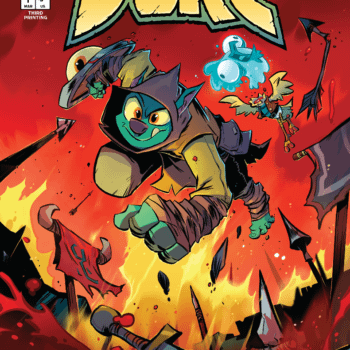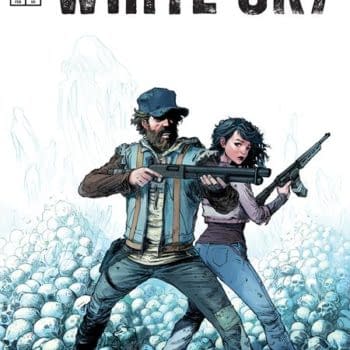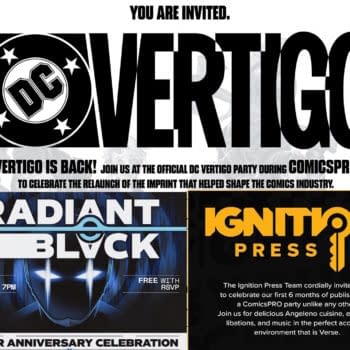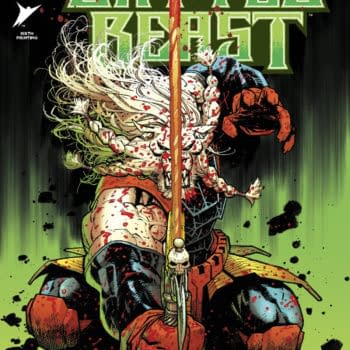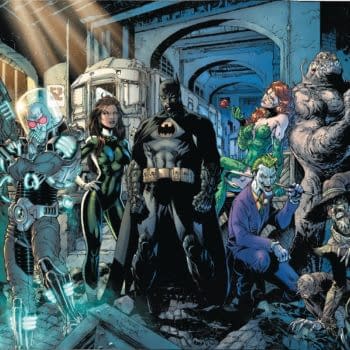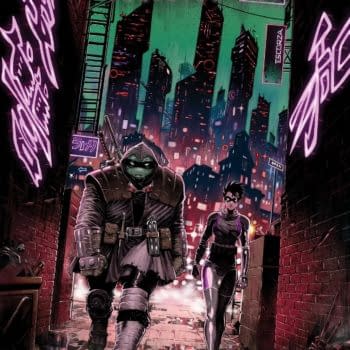Posted in: Comics, san diego comic con | Tagged: Comics, HRL, sdcc 2017, Sonny Liew
My Conversation with Sonny Liew: The Eisner Winner Behind 'The Art Of Charlie Chan Hock Chye'
Nick Kazden writes:
Sonny Liew had a pretty great Comic-Con. On Friday night, Liew was one of the big winners at the Eisner Awards for his book The Art of Charlie Chan Hock Chye. He didn't just win one award, though. Liew walked away with the trophy for best writer/artist, best publication design, and best U.S. Edition of international material from Asia.
For those who don't know, Charlie Chan follows the life of a fictional cartoonist throughout different points in his life. Through the observation of Charlie's life, audiences are taken on a journey through the modern history of Singapore that highlights the one party rule that has dominated the country since it achieved independence. Liew says most people there have "heard the one story about our history all this time" and that they "are vaguely aware that there is a so-called revisionist or alternative history that's kind of on the edges."
"I call it more inclusive than alternative because I think it's not about overturning the current narrative, it's about kind of making a richer and more complex version of it."
While the book may be performing extremely well here and overseas, it was initially met with some trepidation. The project initially received a grant from the National Arts Council for $8000, but closer to the release date, the funds were pulled from the project. Since the grant process included someone from inside and outside the organization examining the book, Liew thought they were in the clear.
"When they withdrew it, we were kind of worried. Book margins are already tight, so to have that $8,000 withdrawn potentially could have been bad but the turnout was very good for us in the end."
Liew's influences stretch across mediums and genres. While he listed artistic legends like Jack Kirby and Harvey Kurtzman, he also pointed to author Jorge Borges as an inspiration. He described one of his short stories about an "infinite library" and said that even though "it was just a few short pages, you can imagine a whole world based on that." Since Charlie Chan tries to create a portrait of an individual "based on the aspects of his work here and there," Liew said his short stories could be seen as an influence on how he told the story.
His process differs whether or not he is illustrating for himself or someone else. When he's working on his own project, he doesn't use a script. For Liew, "The script is the thumbnails so I do those things simultaneously. I'll do the rough drawings together with the text on the same page." But if he is working on a traditional book, like when he was working on Doctor Fate with Paul Levitz at DC, he said he is more limited. In his own books, he has no problem stretching things out because he's "not constrained to a 20-page thing where you have to make it fit in those pages."
One of the most entertaining portions of the book focuses on a time when Charlie attended his first San Diego Comic-Con. Liew first attended Comic-Con in the early 2000s after one of his professors at RISD, legendary Batman illustrator David Mazzucchelli, told him to check it out. When asked about his own earlier experiences at the convention, Liew quickly pointed out a major difference with the portfolio process between the show then and now.
"I remember sitting in line on the floor itself and now they're all upstairs. So it's kind of changed. I think I came back a few years later for another portfolio experience and even then it was different. The companies were a lot less open to seeing talent. There were too many people into comics so they were a little less open to the way they looked at people's portfolios."
As for what's coming next, Liew said he's about three months into the research on a new book about capitalism. While he acknowledges that it's "a big topic" he described the project as "still very vague in its structure and exact scope and nature." He wouldn't say too much, but he did reveal that it will take a look at capitalism around the world instead of focusing on the interesting economic conditions in Singapore.
For all you storytellers who run into plot holes or think their work isn't quite as good as it can be, Liew is right there with you. He said "plot knots," especially in a book this long, are common, and that sometimes he had to find solutions that were just "good enough to get you through it." Even though he just won three awards for the book, he admits that "sometimes I look at it and still wish I had better ideas."







